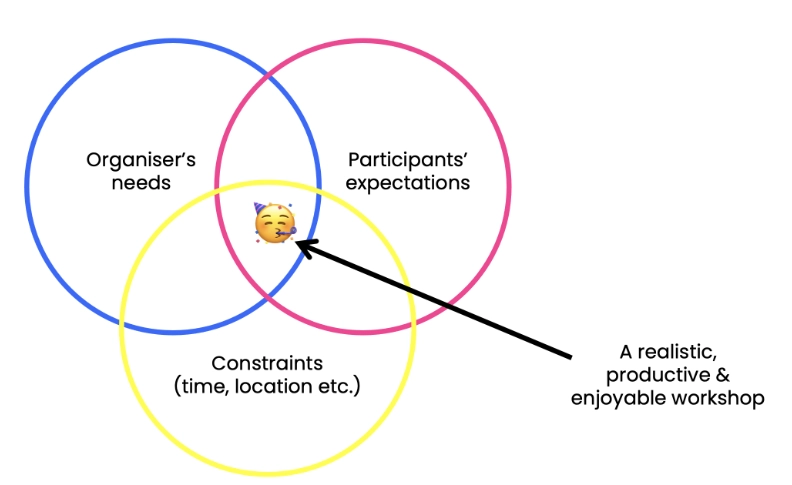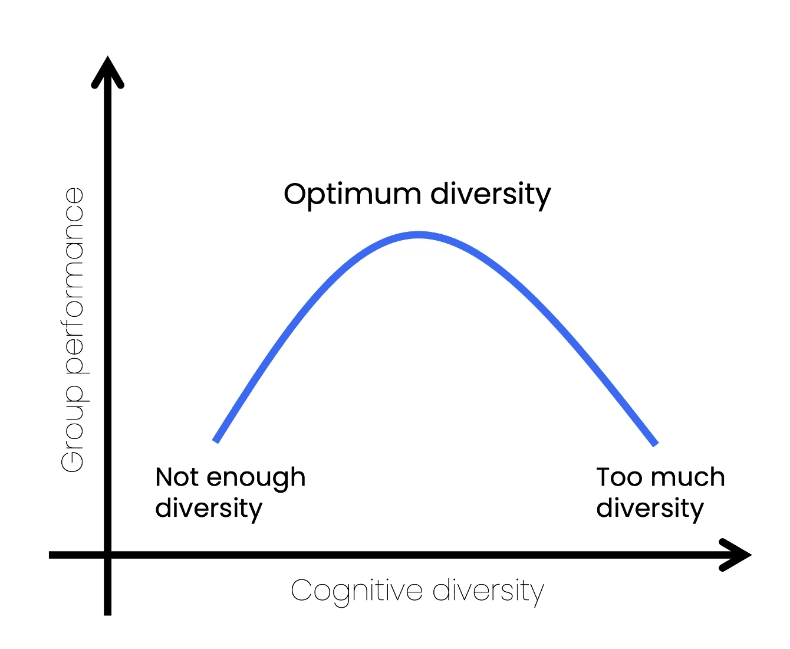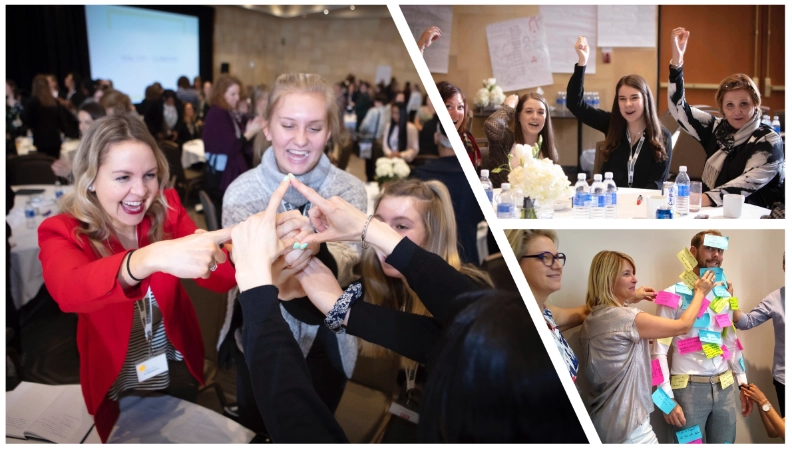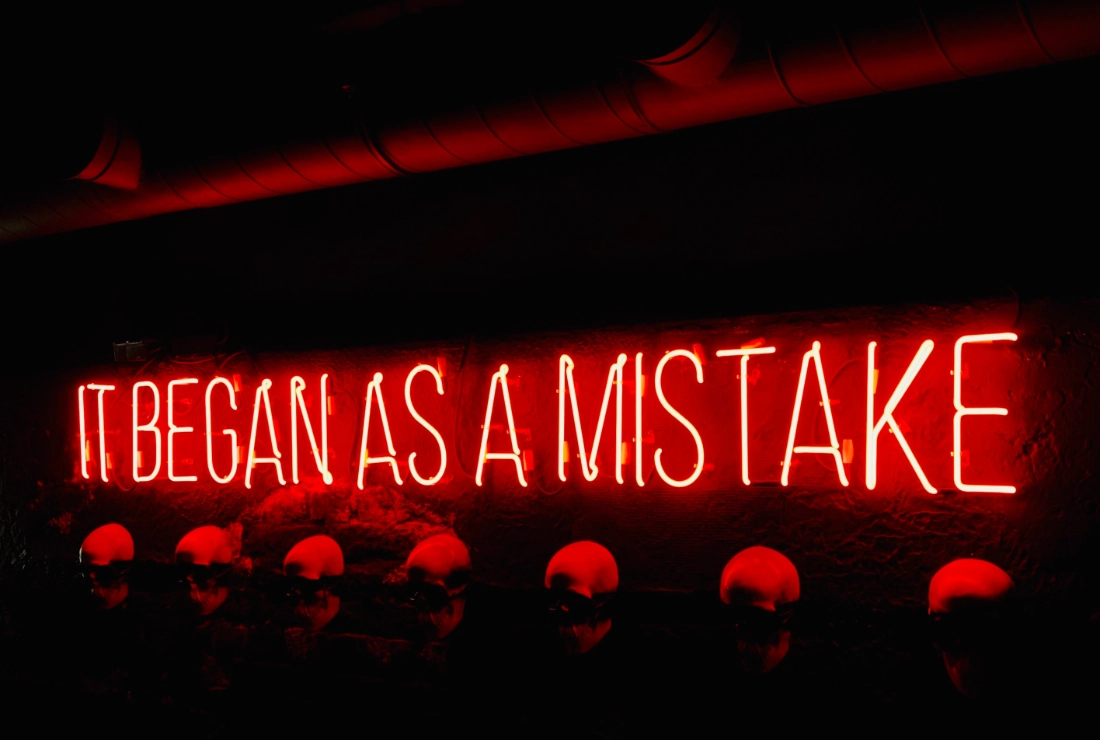We’ve been organising collaborative workshops and collective intelligence sessions for years so our experience and practice now allow us to identify the pitfalls that clients can easily fall into.
As facilitators, since we are responsible for the efficiency of the framework, we believe it is o=pglobur duty to inform and even teach our clients about the main risks that can put the preparation, smooth running, and efficiency of collaborative sessions in jeopardy. As you read that, you may have some clear examples popping into your head - don't you? Here are some of the main pitfalls we had in mind:
1. Failing to consider the expectations of ALL the stakeholders 🤝
When we set up the overall framework, we usually question the workshop’s sponsors about its goals, but also ask them to define what, according to them, participants expect from the session:
- Why do you think participants might be motivated to participate in this workshop?
- What will they get out of it?
- What deliverables – tangible or not – do they expect from the workshop?
It’s relatively common for workshop organisers to be executives, managers or project leaders who invite members of their teams to the workshop. Due to hierarchical, political, and other types of pressure and corporate dynamics, it may be hard for them to directly decline the invitation to a workshop, so it is even more crucial for the facilitation team to understand what kind of involvement they might expect from these participants. If this has been settled right from the start, it’s much easier to design a session that will bring value to everyone involved!

2. Forgetting to prepare for the workshop’s aftermath 📅
What could be worse than a workshop with absolutely zero follow-up? Picture this: the workshop was successful, sparking the interest of the participants in the topic at hand, the session allowed them to share ideas, discuss future projects, leaving them full of hope and expectations. And then... nothing! If you don't come back to the participants and communicate about the workshop's aftermath, they will very likely lose any motivation to take part in collaborative sessions in general.
Like all facilitation teams, our approach is based on your objectives and the deliverables expected at the end of the workshop. To avoid this anti-climactic conclusion, we also ask our clients:
- What will be done with the deliverables?
- What is the timeframe in which participants will be informed of what comes next?
- Who will be in charge of taking over?
Sometimes all it takes is a gentle nudge to keep the collaborative momentum going!
3. Not inviting the "right" participants 🙋♂️
Another factor to be handled with care is cognitive diversity, which can be either promoted to foster creativity or hindered to increase productivity. A recent study (Aggarwal, Woolley, Chabris, & Malone, 2015) even shows that cognitive diversity can only have a positive impact on a group's performance when used with moderation. In other words, an inverted U-shaped efficiency curve: too much diversity and too little diversity are two situations to avoid at all costs. Read the article mentioned in our sources below to learn more about it!

When a workshop brings together a whole team or department, the list of participants is generally limited to all the employees of that specific team or department - for seminar workshops, for instance: all the guests are participants. But why not shake things up to bring new points of view to the discussion? For example, you could suggest to invite:
- Customers for workshops on customer relations, marketing, branding, etc.
- Suppliers for workshops on purchasing, CSR, innovation, etc.
If you can't invite people from outside the organisation, why not consider employees from other departments/teams who have dealt with a somewhat similar issue or hold a different perspective on the problem?
When, on the other hand, you are preparing a workshop with a more flexible list of participants, it’s crucial to find the right balance between inviting a few highly involved participants with pretty much the same point of view, and inviting too many different participants, some of whom are not even remotely interested in the topic. In the first case, you’ll lack a fresh perspective on the subject; the second case will lead to lower participation and mediocre deliverables. Therefore, you should make sure to:
- Invite enough participants, especially people “different enough” to stir stimulating debates. All types of differences could be considered: job position, career background, age, gender, seniority in the organisation, culture, etc.
- Put aside people who do not have enough knowledge of the subject and who will only be able to dedicate a small part of their time.
The easiest way to do this is to:
- List ALL potential participants, indicating their profile/position and what they can bring to the discussion,
- Decide on a short-list to avoid any "redundancy".
This list will also prove useful if some participants cancel their participation: you’ll already have a back-up plan! And if this isn’t feasible, it’s always possible to help the organiser refocus the workshop on one or more areas where participants will have more reasons to actively participate.

4. Misevaluating the time required to reach your goal ⏱
... or setting delivery targets out of tune with the workshop's constraints. A classic example of managers in a hurry and facilitators who don't want to disappoint! Organisers have many objectives for their team and may think that with a few creative tricks and all that brainpower, you'll manage to come up with a strategy AND an action plan… in two hours, tops! 🧠
It doesn't work like that. There are many factors to consider when assessing what participants will be able to produce during your workshop: complexity and importance of the topic, complexity of the deliverables, workshop duration, number of participants, workshop language, location, mental availability of the participants, etc. For this reason, we advise to:
- Start by considering the expected deliverable; according to all the info we have, we’ll evaluate how much time is needed (sometimes it might take TWO workshops!)
- To accept the fact that not everything needs to be done on the day of the workshop with all the participants. Perhaps a draft can be made during the workshop, for a project team to take over and work on it later?
It’s also critical not to be careless about the time needed BEFORE the workshop to frame the topic, set the agenda, prepare the material, etc. But that's not all: while the facilitation team can move swiftly, some decisions can take time on the client’s side: setting the date, drawing up the list of participants, greenlighting the topics, providing the documents, identifying the speakers, etc.
In the field of collective intelligence, it is often said that 1+1 = 3, but this requires preparation! A well-prepared workshop is much more likely to be a success…
5. Getting fixated on ideas that MUST ABSOLUTELY come out during the workshop ⚠️
Not unrelated to our article on the 5 bad reasons for organising a workshop, it can be tempting for the client or sponsor to identify ahead some ideas that they want to get out of the workshop. This is a common pitfall when the organiser knows the topic too well and wants a particular solution/idea to be implemented at the end of the session. As facilitators, our take on this subject is clear: do not use collaborative workshops to sneakily get your message across expecting participants to suggest the idea you had in mind.

According to us, it's one of two things:
- Either the organiser really want to know the contributions, ideas, and opinions of the participants on the topic at hand because the outcome hasn’t been decided and participants have a real added value on the subject. In that case, we should accept in advance that what they bring to the table will not necessarily be what you had in mind.
- Or the organiser would like to convince the participants of the strength of their idea. In this case, they should state it clearly and organise the workshop to discuss the idea, ask about its advantages, disadvantages, how it could be improved, or even to debate its operational implementation.
If a topic is important enough to mobilise a group of participants for several hours, it would be a shame not to take advantage of what these people can bring!
Far be it from us to criticise organisations that sometimes fall into these pitfalls. This list simply aims to assess, question, and take a step back on how we approach the complex issue of collective intelligence. Have you ever fallen into one of these traps? What impact did it have?
Sources
- Aggarwal, I., Woolley, A. W., Chabris, C. F., & Malone, T. W. (2015, May). Cognitive diversity, collective intelligence, and learning in teams. Paper presented at the 2015 Collective Intelligence Conference, Santa Clara, CA
